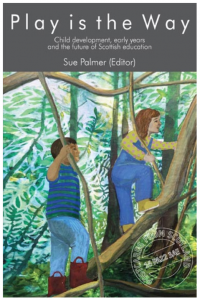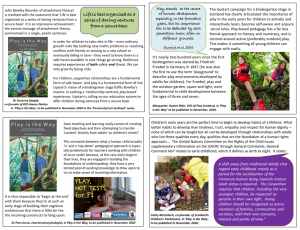
by George Gilchrist, former head teacher, blogger and author of ‘Practitioner Enquiry’
 I have just finished reading Play Is The Way edited by Sue Palmer and containing chapters from some very respected practitioners and academics.
I have just finished reading Play Is The Way edited by Sue Palmer and containing chapters from some very respected practitioners and academics.
Were I still a school leader I would be so happy to receive a copy of this book. As a leader charged with introducing and managing change, I was forever reading lots of articles written by academics and practitioners about changes we were considering. I also wanted to see such changes in action, to see the possible benefits as well as challenges of developing our practice in different ways. Then we would look to shape what we were doing to our particular context. This book gives you a lot of that information for you to consider and apply to your own context.
There is no doubt that play is crucial in early years settings and beyond. Any school leader, practitioner, parent or politician struggling to understand why play is so important should read this book.
 Sue has collected together a variety of ‘voices’ looking at every aspect of play and what it can bring for our earliest learners. This is no rose-tinted consideration but one which explores the historical, cultural and practical barriers and challenges that can get in the way of what the policy-landscape is strongly advocating. The contributors give us all this in an easily readable and engaging way and without us spending lots of precious hours searching for it ourselves.
Sue has collected together a variety of ‘voices’ looking at every aspect of play and what it can bring for our earliest learners. This is no rose-tinted consideration but one which explores the historical, cultural and practical barriers and challenges that can get in the way of what the policy-landscape is strongly advocating. The contributors give us all this in an easily readable and engaging way and without us spending lots of precious hours searching for it ourselves.
The book explores the cultural influences, philosophies, history and the science lying behind the need for all early learning centres and schools to be embracing and using play as the major pedagogical tool for our youngest learners. Not only that, it is filled with practical examples of how different settings and practitioners have used play to develop a deeper and more meaningful learning experiences for their learners and how this all fits into, or struggles against, the current political and strategic frameworks at play in Scotland.
You can buy Play is the Way at https://postcardsfromscotland.co.uk/play-is-the-way


